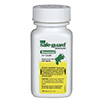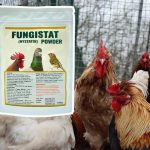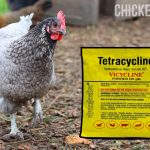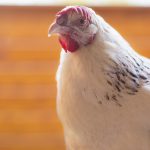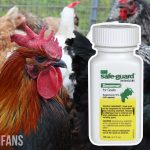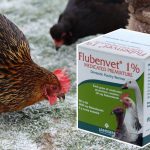Flubendazole For Chickens: Dosage, Use, Egg Withdrawal
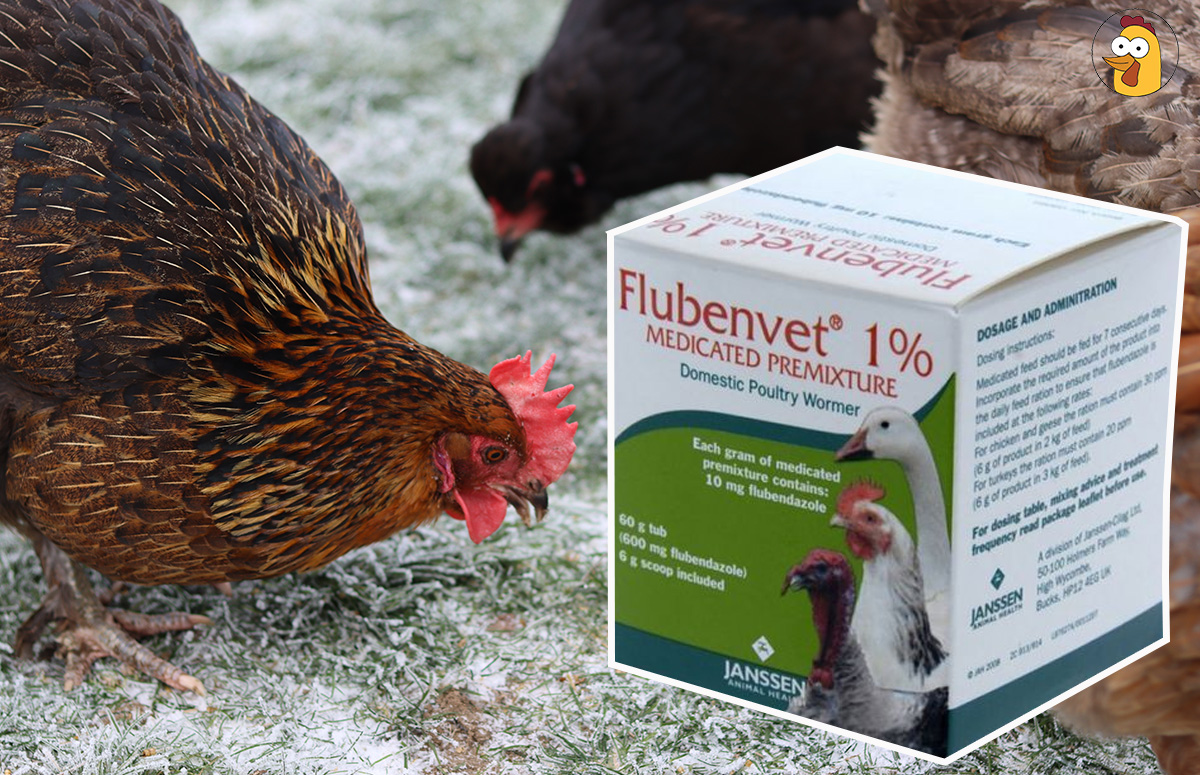

Worms are, unfortunately, an inevitable part of raising chickens. Regardless of your flock’s age or health, intestinal parasites will eventually affect them. One of the most effective treatment options available is Flubendazole.
Let’s go over the use, dosage, side effects, and egg withdrawal of Flubendazole.
What is Flubendazole?
Flubendazole is an anthelmintic drug that kills a wide range of internal parasites in chickens, turkeys, and game birds. It is used against:
- Caecal worms
- Hairworms
- Gizzard worms
- Roundworms
- Gapeworms
Flubendazole is not approved or regulated by the FDA in the United States. Because of this, U.S. chicken owners often use alternatives like SafeGuard (Fenbendazole).
These products are intended for other types of livestock, so they require careful dosage when used on chickens.
Common Brand Names of Flubendazole are:
- Flubenvet
- Flubenol
- Flumoxal
- Flimabend
- Solubenol
- Biovermin
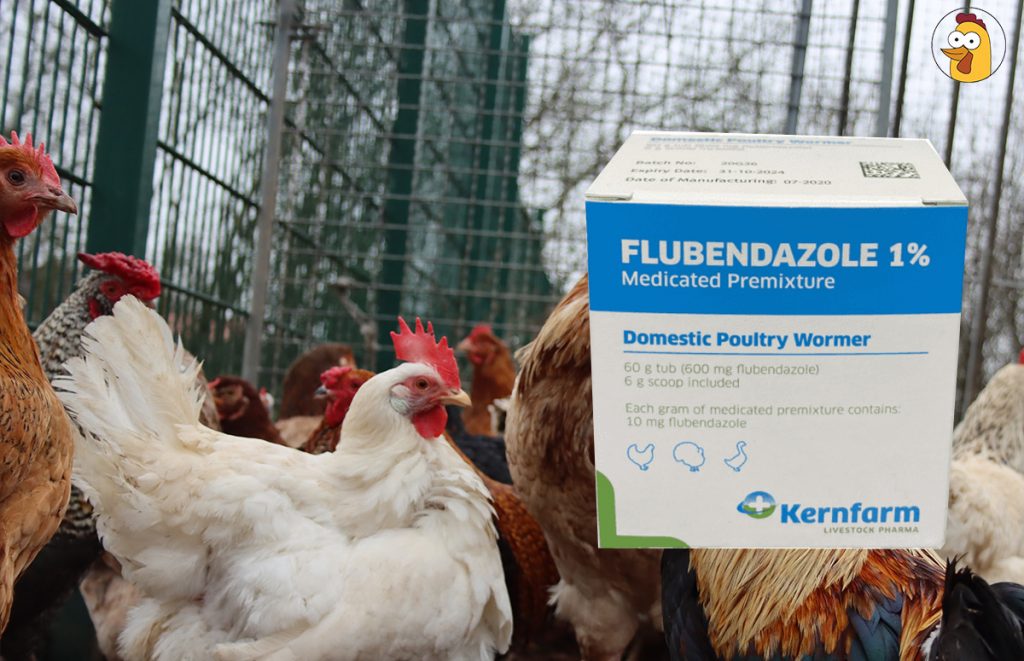
Dosage of Flubendazole for Chickens
The dosage of Flubendazole in this bird species depends on the types of parasites you want your birds to be rid of and the way you are administering the medication. Generally, this medication can be found in several forms:
- Feed additives
- Tablets
- Drenches
Note: Flubendazole should not be given in drinking water due to its poor solubility.
Dosage varies based on the parasite type and bird species:
| Bird Type | Type of Worm | Dosage (mg per lb of feed) | Amount needed per 10 lb of feed |
| Chickens & Geese | GI Roundworms | 13.6 mg/lb | 2.72 g |
| Tapeworms | 27.2 mg/lb | 5.44 g | |
| Pheasants & Partridges | Tapeworms | 27.2 mg/lb | 5.44 g |
| Turkeys | GI Roundworms | 9.07 mg/lb | 1.81 g |
All the above dosages need to be given for a consecutive period of 7 days.
Please always consult your vet for the correct dosage for your use.
Side Effects of Flubendazole in Chickens
Flubendazole is similar to other benzimidazole drugs like fenbendazole, oxibendazole, and mebendazole. These medications generally cause the same types of side effects.
While chickens usually handle flubendazole well, some side effects can happen, especially if the dose is too high.
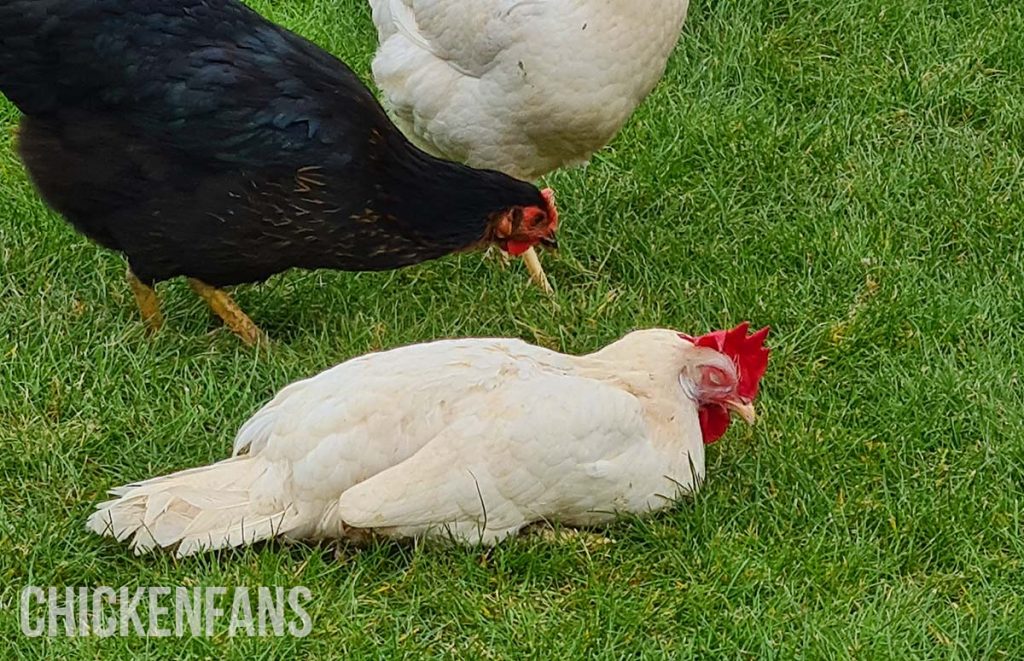
One study highlighted some side effects chickens can experience when undergoing treatment with flubendazole. Most of the side effects in chickens range from overall malaise to diarrhea.
Some other side effects noticed were:
- Dull performance
- Lack of appetite
- Anemia
- Liver and kidney damage
Egg Withdrawal with Flubendazole in Chickens
While some sources suggest there is no egg withdrawal time when you treat chickens with flubendazole, the truth is that every medication you give your birds gets passed onto the eggs.
Anyone eating the eggs while the birds are undergoing treatment would consume trace amounts of the drug, as well. Most vets recommend waiting for at least three to seven days after the end of the treatment before consuming the eggs.
Meat Withdrawal with Flubendazole in Chickens
The withdrawal time for meat consumption after flubendazole treatment is 7 days. This waiting time applies to chickens, geese, and turkeys.
How Does Flubendazole for Chickens Work?
While the chemical mechanism is relatively complex, the way Flubendazole kills worms can be simply explained.
It binds to a protein in the microtubules of the parasites, leading to cellular dysfunction and eventual death. The worms are then expelled naturally through the digestive tract.
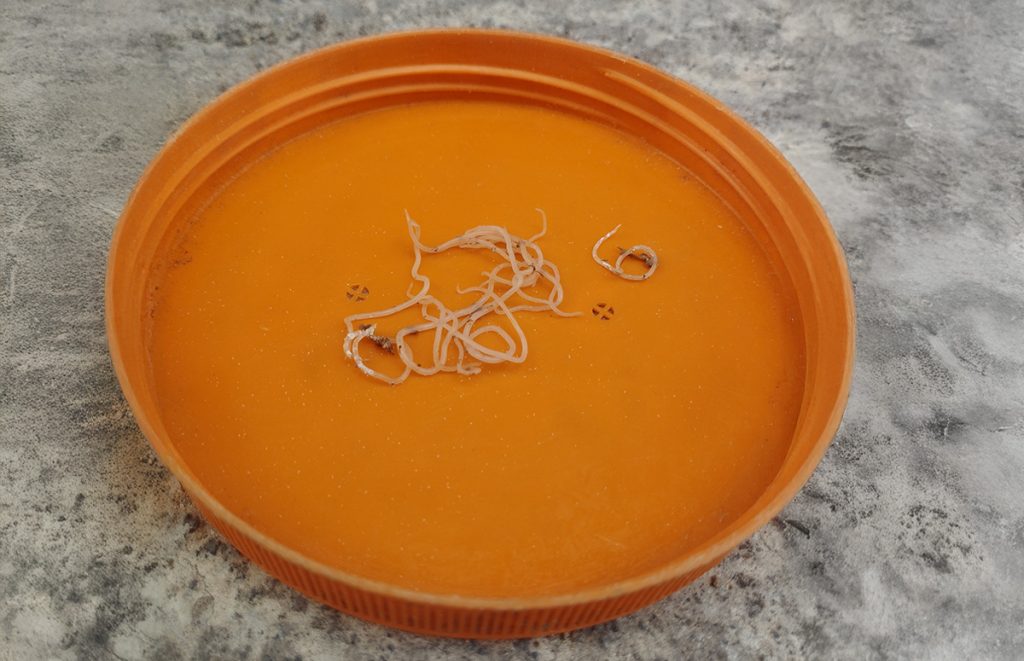
What makes Flubendazole so effective and safe is its targeted action. It has a specific affinity for the protein we mentioned, minimizing its impact on the chicken’s body.
However, like any medication, it can cause adverse reactions.
Another key point is that other medications can influence Flubendazole’s effectiveness. Combining it with other anthelmintics is not recommended, as this could alter the treatment outcome.
Alternatives for Flubendazole in Treating Worms
Flubendazole is a popular anthelmintic drug, but it is not the only option for treating parasitic infestations in chickens. The poultry version is also unavailable for sale in the United States, making its acquisition challenging.
While it is not illegal to import flubendazole from other countries, its use in chickens requires careful consideration of dosage due to its lack of FDA approval.
Here are some alternatives for flubendazole:
Fenbendazole
One popular alternative for flubendazole is fenbendazole, which is effective against roundworms and tapeworms, although it does not perform as well as flubendazole against Capillaria worms.
Fenbendazole is readily available under brand names such as Safe-Guard and Panacur.
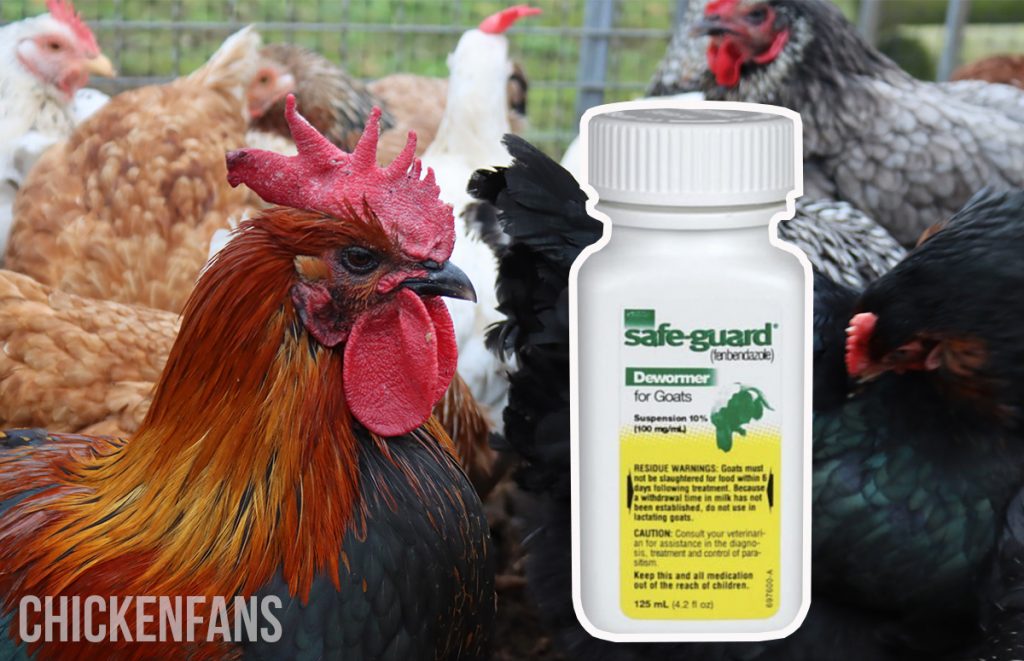
Albendazole
Another alternative is albendazole, which requires only a single dose for administration. However, it shares the limitation of flubendazole in that it has not been approved for poultry by the FDA.
Cambendazole
Cambendazole is another option that your veterinarian can prescribe. Although not sold over the counter in North American countries, it can effectively treat nematodes and tapeworms.
Levamisole
Levamisole is a more accessible medication for poultry as it has been approved for veterinary use in the United States.
An added advantage is that it is water-soluble, making it easier to administer through drinking water, especially for smaller flocks where dosage precision is more manageable.
Ivermectin
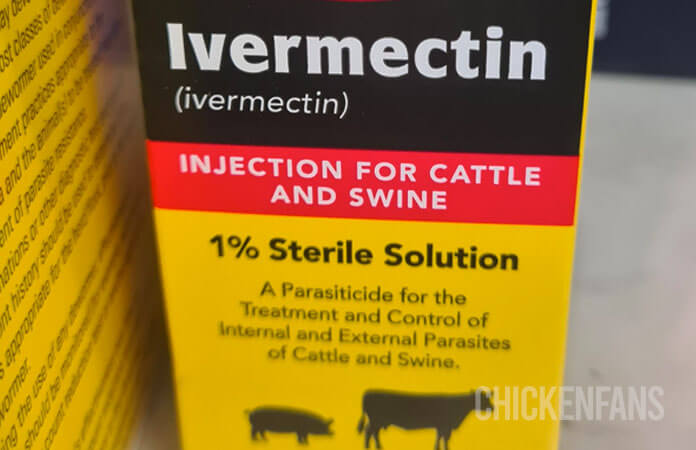
Ivermectin is a safe and effective drug against many internal and external parasites. In chickens, it doesn’t work against tapeworms, but it does kill many other worms, from gapeworms to Capillaria.
Spot-on solutions are also very effective against lice and mites.
Apple Cider Vinegar
Apple cider vinegar has many benefits not just for chickens but also for other animals and people.
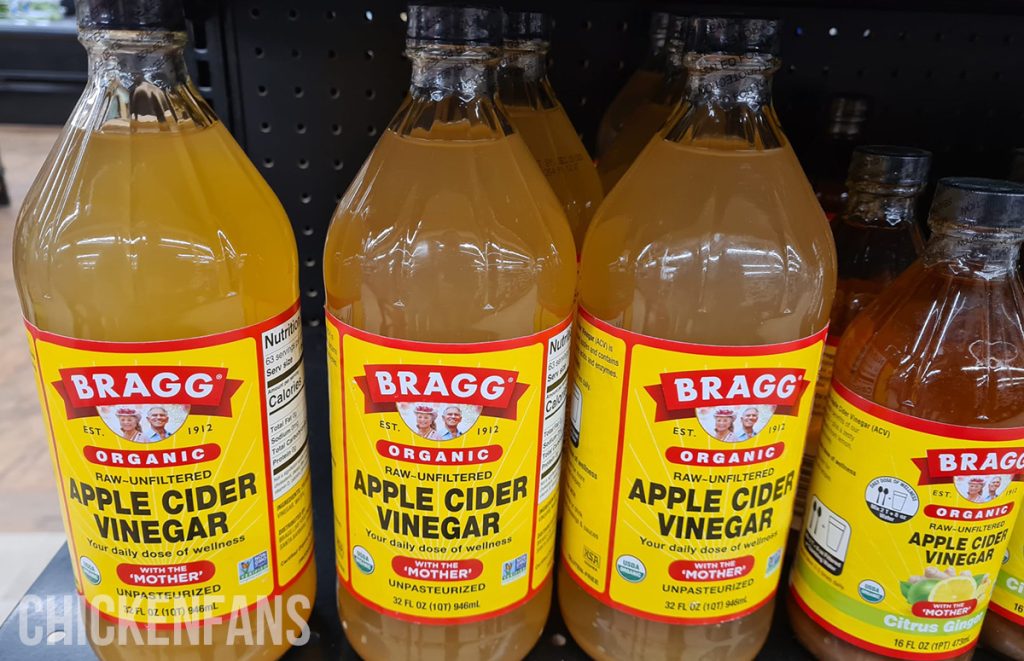
But unfortunately, it can’t be considered a dewormer. Despite its reputation, ACV doesn’t directly kill the parasites.
Some species, especially tapeworms, are highly resistant even to some form of pharmaceutical drugs, so while we do recommend ACV for maintaining healthy bacteria in your chicken’s intestines, this product is not an anthelmintic drug.
How Often to Use Flubendazole as a Dewormer
Flubendazole is effective as a dewormer but should not be used continuously.
It is commonly used as a preventative treatment in the spring and fall. A standard treatment lasts seven consecutive days.
If worms are detected more than twice a year, the treatment should be repeated as necessary.
Difference Between Flubendazole and Fenbendazole
There is a difference in use and effectivity between flubendazole and fenbendazole.
Flubendazole is used as a dewormer for the following species:
- Ascaridia galli (roundworm)
- Heterakis gallinarum (roundworm)
- Capillaria spp. (roundworm)
- Raillietina spp (tapeworm)
- Ascaris suum, Hyostrongylus rubidis, Oesophgostomum spp, and Metastrongylus apri – in pigs
Fenbendazole kills the following species of worms:
- Ascaridia galli (roundworm)
- Heterakis gallinarum (roundworm)
- Capillaria spp. (roundworm) – may not be as effective as flubendazole
- Giardia – which flubendazole doesn’t kill
- Oxyspirura mansoni – which flubendazole doesn’t kill
- Prosthogonimus spp. (flukes, as in trematodes) – which flubendazole doesn’t kill
It is, therefore, impossible to assume which medication is better than the other.
If your chickens have roundworms and you treat them with either fenbendazole or flubendazole, you have a good chance of having the same results. But if they have flukes, only fenbendazole will work.
All in all, the main difference is in the parasite types that can’t be killed by flubendazole — that’s where fenbendazole is actually more effective.
Summary
Flubendazole is an effective and safe dewormer for chickens, capable of eliminating various parasites, including roundworms, hairworms, and gapeworms.
It may also be effective against certain tapeworms, although a higher dosage is required for those.
While this medication is not approved for use in chickens in the United States, poultry veterinarians in the EU and UK do prescribe it.
- For roundworms and cecal worms, apply 0.1 – 0.23 ml per pound of body weight orally with a syringe once, repeat after 10 days
- For cappilaria, apply 0.1 – 0.23 ml per pound of body weight every day for 5 consecutive days
- For gapeworm, apply 0.136 ml per pound of body weight for 5 days
- For flukes, apply 0.1 – 0.23 ml per pound of body weight for 3 days
- Avoid during molt: can cause feather damage at regrowth
